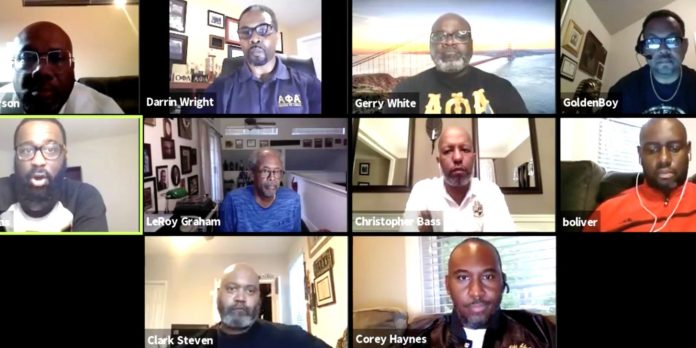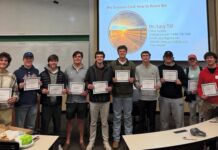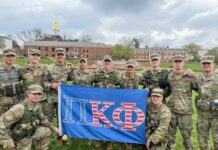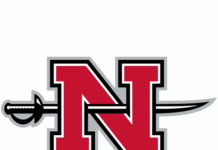When it became obvious last month that the coronavirus was hitting African Americans harder than other racial groups, Gerry White, a sociologist and an associate professor at Clark Atlanta University, grasped that black men needed to play a pivotal role in leading the fight against its spread in their communities.
“We are the protectors of the black family, and we need to be armed with all the information about this new threat to assure we are knowledgeable and our households are safe,” White, who lectures on the power of the black family and manhood, told NBC News. “We know that communication, resources and strength-based approaches to protecting the community are critical in this fight.”
With that thought came the birth of “Chat With the Frat,” an all-male online series made up of members of the Atlanta-area Omicron Phi Lambda chapter of Alpha Phi Alpha — the first Greek-letter fraternity for black men, founded in 1906.
“Black men talking to other black men has the ability to alter our thinking and subsequently our behavior,” forensic psychologist Christopher Bass said. “Despite what society suggests, humans are still more conforming than rebellious.”
The sessions are “transformative,” White said, because they address an underlying skepticism that permeates the black community: lack of trust.
That stems from the history of mistreatment of African Americans in clinical trials, particularly the federal government’s infamous 40-year Tuskegee syphilis study on black men. Given the inaccuracy of information being disseminated on the coronavirus these days and the disproportionate access to treatment in underserved areas of the country, that distrust is palpable.
“If you trust the source, you embrace vital information—not innuendo, rumors and guesses—and share among your family and community,” chapter president Marshall Taggart said. “That’s what we are doing. We have a vast reach and we are sharing what we learn family-by-family, and on our YouTube channel on a larger scale.
“The number of COVID-19 cases in black communities is staggering, and the entire point of what we are doing is to suppress those numbers by empowering black men, who, in turn, empower communities. We hope other organizations will follow our lead.”
The Alphas hold weekly two-hour interactive webinars on Sunday evenings for its 117 members in South Fulton, outside of Atlanta. Gov. Brian Kemp stunned many when he recently reopened certain businesses in Georgia, defying many scientists who said it was too early and could spark a spike in coronavirus cases.
“This act by the governor illuminates why what we are doing and sharing in the community is so important,” White said.
The panels of medical doctors, public health experts, psychologists and other specialists are members of Omicron Phi Lambda. They lead discussions on various aspects of COVID-19 and its effects, sharing information, reports, models, other data and educated opinions. Additionally, they share, as black men, their stories and concerns that influence how they go about their lives.
“Being safe today is different from it was two months ago,” James (Jet) Thomas, a member of Alpha, said. “Before it was racism and crime and other known forces. Now, it’s also this coronavirus that is not discriminating, although it is harder on us. So we discuss how to be safe in this new world: staying home, resisting the urge to return to ‘normal,’ leading by example in our home, sharing what we learn with others in the community. It’s like a grassroots movement.
“And it’s different when you hear it from brothers you trust. It sticks with you because of the trust factor.”
The National Council of Negro Women last Thursday sponsored a similar one-time webinar called Male Perspective on Health, Economic and Spiritual Challenges of COVID-19.
Other black fraternities across the country—Phi Beta Sigma, Iota Phi Theta, Omega Psi Phi, Kappa Alpha Psi—have engaged in community service acts around the coronavirus, donating food and supplies, serving the homeless, and participating in interactive sessions with youths.
The Alphas as a fraternity have done similar work, but the Omicron Phi Lambda chapter has taken to sessions on Zoom as a way of affecting black communities. The first event was led by Leroy Graham, a retired pulmonology specialist, and Terry Dickerson, a podiatric surgeon, who broke down the technical aspects of the coronavirus and its dangers.























